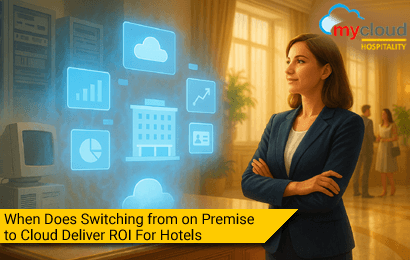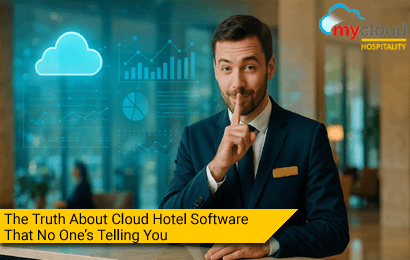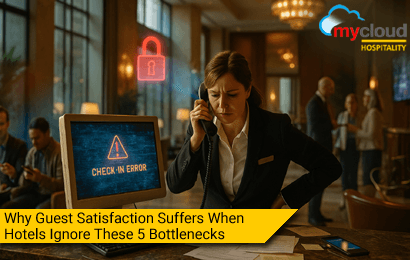The hospitality industry has entered a new era, where technology is no longer just an enhancement but a necessity. From AI-driven chatbots to IoT-powered smart rooms, digital innovation is revolutionizing how hotels operate and serve guests. In an increasingly competitive market, adopting the latest hospitality technology for hotels is critical for ensuring operational efficiency, improving guest experiences, and driving revenue. Hotels that fail to embrace technological advancements risk falling behind as guest expectations continue to evolve.
Let’s explore how technology is shaping the future of the hospitality industry.
Why is Technology Important in Hospitality?
Technology plays a crucial role in elevating guest satisfaction and streamlining hotel operations. Digital solutions like AI-powered chatbots provide instant customer support, while mobile check-ins offer convenience and reduce wait times. According to a 2023 survey by Hospitality Tech, 74% of guests prefer hotels that offer digital self-service options.
On the operational side, hotel technology assists management in optimizing workflows, automating routine tasks, and improving staff efficiency. Cloud-based property management systems (PMS) help track reservations, manage inventory, and coordinate housekeeping effortlessly. Hotels that integrate technology effectively experience higher efficiency, increased bookings, and improved guest retention.
Let’s explore the impact of technology on the hospitality industry in greater detail.
The Impact of Technology on the Hospitality Industry
Enhanced Guest Experience Through Automation and Personalization
Personalization is the new standard in hospitality, and technology is making it possible at scale. AI-driven recommendation engines analyze guest preferences, ensuring tailored experiences like customized room settings or special dining recommendations. Hospitality stats revealed that 86% of guests appreciate AI-based personalization during their hotel stay.
Streamlined Operations with Cloud-Based Solutions
Cloud-based hotel management systems have revolutionized back-end operations, reducing manual errors and boosting productivity. By centralizing data and automating routine processes, hotels can operate with greater agility. The global cloud PMS market is expected to reach $5.2 billion by 2027, emphasizing its growing significance in hospitality (Source: MarketsandMarkets).
Data-Driven Decision-Making for Revenue Growth
Hotels leveraging big data and analytics can optimize pricing strategies, predict customer trends, and enhance marketing campaigns. By analyzing booking patterns, hotels can maximize occupancy rates and increase revenue. According to Deloitte, hotels using data-driven strategies saw a 10-20% increase in profitability.
Contactless Services and Mobile Solutions
The demand for contactless experiences has surged, with guests preferring mobile check-ins, digital room keys, and app-based services. Research by Skift found that 73% of travelers are more likely to choose hotels offering contactless check-in options.
Let’s dive into the key hotel technology trends shaping 2025.
Top Hotel Technology Trends for 2025
Artificial Intelligence (AI) and Machine Learning
AI is driving a new level of efficiency and personalization in hospitality. Chatbots and virtual assistants provide 24/7 customer support, resolving inquiries instantly. Marriott International, for instance, uses AI-driven chatbots to handle over 60% of customer interactions, significantly reducing response times.
Automated check-in/check-out systems powered by AI enhance guest convenience. AI-based predictive analytics help hotels optimize marketing efforts and revenue management. According to PwC, hotels implementing AI in revenue management have increased RevPAR (Revenue per Available Room) by up to 15%.
Let’s explore how smart rooms and IoT integration are enhancing guest stays.
Smart Rooms and IoT Integration
IoT-powered smart rooms are transforming hospitality by enabling voice-controlled lighting, temperature settings, and entertainment systems. Hilton’s “Connected Room” allows guests to personalize their environment via mobile apps, improving comfort and convenience.
Energy-efficient IoT devices are also helping hotels reduce costs. According to the International Energy Agency, smart energy management systems lower hotel energy consumption by 20-30%, leading to significant cost savings.
Let’s look at how mobile-first experiences are reshaping guest interactions.
Contactless and Mobile-First Experiences
Mobile keys, digital wallets, and app-based services are now standard expectations. Marriott’s Bonvoy app enables mobile bookings, digital room keys, and mobile concierge services, enhancing the guest experience. The adoption of self-service kiosks has also surged, cutting check-in times by 70% (Source: HotelTechReport).
Hotel software solutions are further enabling seamless, contactless interactions, making guest experiences more convenient and secure.
Revenue Management and AI-Powered Pricing
AI-driven revenue management systems (RMS) are revolutionizing hotel pricing strategies. By analyzing market demand, competitor pricing, and historical booking data, these systems ensure optimal room rates. STR reports that hotels using AI-based RMS experience a 7-10% increase in revenue per available room.
Let’s now explore how top hotel software is shaping the industry’s future.
The Role of Hotel Software in Shaping the Future
Centralized Property Management Systems (PMS) for Efficiency
Modern PMS platforms automate hotel operations, reducing human errors and enhancing guest service efficiency. Cloud-based PMS solutions like mycloud allow hotels to manage reservations, housekeeping, and payments from a single dashboard.
CRM Integration for Personalized Marketing
Customer relationship management (CRM) tools help hotels maintain guest profiles and deliver targeted marketing campaigns. Accor Hotels, for instance, uses CRM analytics to personalize offers, resulting in a 20% increase in repeat bookings.
Automated Housekeeping, Inventory, and Staff Scheduling
AI-powered hotel management tools automate housekeeping schedules, track inventory levels, and optimize staff allocation. This ensures operational efficiency while maintaining service quality. According to McKinsey, automation in hotel operations can reduce labor costs by 15-30%.
Enhancing Decision-Making with AI-Powered Analytics
Advanced analytics tools provide hoteliers with actionable insights into guest behavior, revenue trends, and operational efficiency. Hotels leveraging AI-based analytics can improve demand forecasting and optimize pricing strategies.
Hurdles in Bringing in New Hotel Tech
While technology promises efficiency and innovation, implementing new hotel tech comes with challenges. Budget constraints can make it difficult for smaller hotels to invest in advanced solutions. Additionally, integrating new technology with legacy systems often requires significant time and resources. Staff training is another barrier, as employees need to adapt to new tools and workflows. A report by HospitalityNet indicates that 68% of hotels face difficulties in transitioning to new technology due to integration issues and budget limitations.
Why Choose mycloud Hospitality as Your New Hotel Tech?
mycloud Hospitality offers an all-in-one cloud-based solution designed to address these challenges. It provides seamless integration with existing systems, reducing implementation time and costs. With user-friendly interfaces and automated training modules, staff can quickly adapt to new workflows. The platform also offers scalable pricing, making it accessible to hotels of all sizes. By choosing mycloud Hospitality, hoteliers gain a reliable, future-proof solution that enhances efficiency, optimizes revenue, and delivers exceptional guest experiences.










